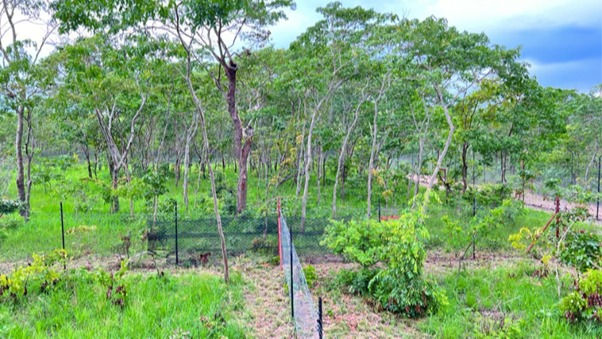Primate Transit Home reshuffle
- Dec 28, 2023
- 4 min read
After the recent release of 27 vervet monkeys back into the wild, there has been some adjustments within the ZPP Primate Transit Home in Kafue National Park. The main vervet enclosure, which was made empty, has now been thoroughly cleaned and prepared for the next release troop to move in and it was also time to move some youngsters out of the Nursery and into their new family troops.

The primate enclosures are 60x60m (with smaller integration paddocks at the front) and provide the recovering primates with ample space for movement, play and socialisation, as well as natural trees to hone their arboreal skills, until they are ready to be released. The external fence is electrified to prevent escapees and the primate enclosures are further protected with an electrified periphery fence to ensure predators are kept at bay.

Here we see young baboons Mandy (1 yr) and Chikinho (1yr 3mo) having been relocated from the Nursery to the night room next to the main baboon enclosure. This has given them their first exposure to adult baboons since the time they lost their mothers. At first, when they saw the big baboons, they were scared and nervous, but the after some minutes they calmed down, and Success a high-ranking female of the baboon troop was very interested in them and started touching them through the mesh enclosure (Success is seen here at the back in the centre). Ensuring this first encounter is across the mesh fence provides these young baboons with security, as they can move away when they feel uncomfortable. We also need to ensure this is a gradual transition as the dominant male, Chimfunshi, could otherwise become aggressive, so we are watching carefully for his acceptance of these newcomers into ‘his’ troop. Thankfully Success has been very gentle and reassuring to them and we feel confident they will be able to integrate within the new troop in the coming weeks.

Chimfunshi, the dominant male of the yellow baboon troop is a critical member of this surrogate family. To be safely released it is essential there is a strong leader to keep his troop safe against other wild baboon families. With the addition of Mandy and Chikinho the troop is now 10 individuals. The ideal number for a family size is12 to ensure group security and maximise survival, so we will wait for two more individuals before this troop is ready for release.

We were very pleased to see how well Mandy adapted to this relocation, as previously she had developed a very close bond with her Nursery mate, Kanono, a young vervet monkey who was rescued at the same time. Frequently Mandy and Kanono were seen reassuring each other and hugging one another throughout their 6 months spent in the Nursery. However, with the introduction of a young male baboon, Chikinho, we saw an immediate recognition of the same species, and both Mandy and Chikinho developed a close bond during their one month together in the Nursery. This helped lessen the dependence between Mandy and Kanono, and Kanono also then paid more attention to her own species age mates, Chali and Albert. So, when the day came to relocate these youngsters into their species-specific enclosures, we saw no signs of stress at their separation and both Mandy and Kanono focused their attentions on their male counterparts.

Chali, Albert and Kanono were initially relocated from the Nursery to the night rooms alongside the main vervet enclosure to begin their transition into a new family troop.
After a few days in the night room and some positive interaction through the fence with the other monkeys, in particular with Tiny, the young vervets were able to be let out into the integration pen where they could have free contact with Tiny, and then within a couple of days of friendly behaviours they quickly moved into the main enclosure. The vervet troop is currently comprised of juveniles, so there is no dominant male and hence it has been easier to introduce these newcomers making the vervet troop now to 7 individuals. When they moved inside there was lots of excitement and playing and chasing each other in friendly way. They were very excited by the space and freedom of the main enclosure and climbing up the large trees.

This now leaves 4 young babies (James, Bubu, Max and Mabula) in the Nursery where they have been busy exploring the space and playing a lot among themselves. Typically, these youngsters spend up to 1 year in the Nursery while they continue to be milk fed and weaned onto fruits and solid foods.
The GRI-Zambia Primate Project operates in partnership with the Department of National Parks and Wildlife, Born Free Foundation, Olsen Animal Trust, Humane Society International-Australia, and African Parks who work as partners to manage Kafue National Park.
Why not start the new year as a monkey mother? Become an adoptive parent to our orphaned primates and help give them this second chance for life back in the wild where they belong.
Article by Rachael Murton, Wildlife Rescue Director














Comments